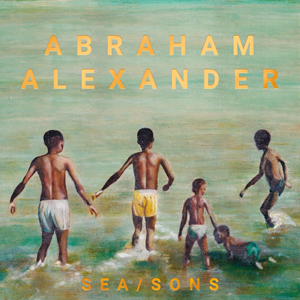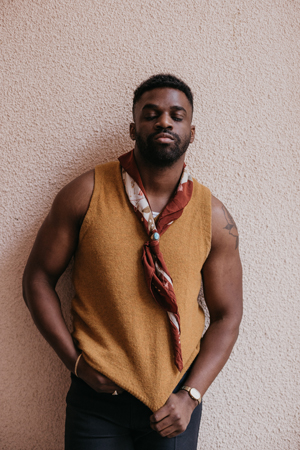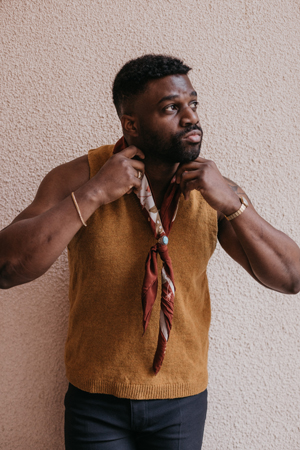PRESS RELEASES
November 30, 2023 / VIEW
October 11, 2023 / VIEW
August 7, 2023 / VIEW
May 31, 2023 / VIEW
May 22, 2023 / VIEW

album artwork / click for hi-res version

photo credit: Elle Caerbert / click for hi-res version

photo credit: Elle Caerbert / click for hi-res version
click here for Artist Notes (pdf)
click here for One Sheet
ABRAHAM ALEXANDER
When Abraham Alexander unspools his extraordinary life story, it becomes clear that he should always trust his instincts. Each time he has, something unknowable but amazing has happened for him. MORE ABRAHAM ALEXANDER
SEA/SONS
Born in Greece, where he spent the early part of his life with the Acropolis as his playground, Abraham was transplanted to Texas in the early 2000s at 11 years old to escape the ever-present racial tension of his birthplace. Adopted in Texas after losing his mother in a car accident with a drunk driver, Abraham became a sports nut who excelled on the pitch and had first set his sights on a career in soccer. A torn ACL sidelined those ambitions but opened the door to a new path. A friend handed him a guitar during this downtime, and, without warning, his soul was unlocked.
Songs he did not know that he had in him poured out. A series of increasingly incredible chance meetings—including a life-changing encounter with Leon Bridges—led him to nurture this newfound musical voraciousness. Those roads have converged on his forthcoming album SEA/SONS, out on Dualtone Records in 2023.
Co-produced by Alexander with the help of several folks including Matt Pence and Brad Cook, the album is a lush, seductive affair that showcases the 31-year-old singer-songwriter’s beguiling voice—one which offers both honey and grit—and supple acoustic guitar work. The 11 tracks on SEA/SONS display a cool assuredness even as the songs themselves play with themes of loss, redemption, longing, anguish and joy informed by a complex life of love and pain. There is a refreshing genre fluidity at play as elements of folk, pop, rock, R&B, gospel and even electronic music meld and tangle. Ineffable backing vocals, sparse but rich arrangements and a sense of emotional purpose draw the musical threads together into a cohesive whole that is simultaneously warm and cool.
From open mics in Fort Worth, TX to recent stints on the road opening for Leon Bridges, Ani DiFranco and Mavis Staples—an instructive trinity for his sound—Alexander is ready for the headlining spotlight and to articulate what many of us are feeling with SEA/SONS.
Do you remember much about Greece?
I have very fond memories of Greece, especially looking back through a different lens than I had as a kid. I enjoyed the freedom of running around and my backyard was history! My backyard was the Acropolis and the Parthenon and when we did school, we would do a lot of it outside. We were taught the freedom of how to think and not so much what to think and that was allocated to me at a very young age. There was, however, a racial aspect to it, which is why we left. While there was an African community and my birth parents took us to a Black church on Sundays, my older brother and I were the only Black kids at my school. There was a lot of racial tension going on. My birth parents came to the United States because of that and for a change of pace and a better life for their kids.
You have called them your “birth” parents. Are you adopted?
Yes, I was adopted later in my teens. My birth mom was killed by a drunk driver shortly after we moved to the United States, and it caused some chain reactions in my family that led me to be adopted. That’s why family is so important to me and why I was so glad to have found it in sports and music.
Did your love of music begin in Greece or after you arrived in the States?
It was definitely here. My dad was a guitar player. Our relationship was sometimes difficult, but he definitely passed on a love of music. He loved jazz and my mom was a singer, so I grew up being touched by it. But I wanted nothing to do with it. It was definitely sports that I thought was the route for me. Sports was where I felt a sense of family.
But then I tore my ACL playing soccer in my early 20s and my girlfriend at the time gave me a guitar, saying, “Do something with your life instead of just moping around.” As soon as I started playing and learning, I would watch YouTube videos of guys like Gary Clark Jr. and Bill Withers, and I became enamored by people of color who looked like me, who were just fierce with their instrument and the things that they were saying. It was like someone gave me a pen for the first time and I was able to write what I was feeling. I had never felt that way before.
I discovered I had an ear for it and the ability to express myself like I never had before just made me fall in love with it even more and dive deeper into music. The fact that I couldn’t really move at the time to do what I wanted to do, I thought, “I’m going to press on to this guitar and try to move as fluidly with my voice and this instrument as I did on the field.”
What was your first break?
I was working as a bank teller at the time, rehearsing on my lunch break. I became friendly with one of my customers; a very big no-no but something in me was just like, you need to talk to this guy. It was weird, but it was that intuition that I could not dismiss. He invited me over to his place but when I got there, he wasn’t home yet so I sat on his stoop. I noticed two guys getting out of their car and offloading amps. The voice again was like, you need to go see what these dudes are doing. They told me they were recording this guy named Leon Bridges and asked me if I could sing. I said no. Then they asked if I could hum, and I said yes. They told me to come back the next day.
The next day, I work the longest shift I’ve ever worked. At the end of the day, I decided I was just going to go home but then the way I needed to go was blocked so my intuition said, “I’m not going home. I’m actually going to check out this dude that they’re recording, this guy named Leon Bridges.” I got there and it was like heaven. I had never been to a studio before. I’ve never seen anyone like a team collectively come together for something bigger than themselves. It was the first time that I’ve ever seen something like a sports situation now happening in this musical realm. I sang on “River” and “Coming Home” and some other songs on the record. Leon was like, “Dude, start doing open mics and see what happens and see where it takes you.” That’s how I started taking music seriously. Soon after, I started playing open mics and I got an opportunity, again through a stranger approaching me, to open a local show for Ginuwine and that’s when I realized I could actually do this. I quit both my jobs and decided to pursue music with the support of my family.
I’m just very grateful for the people in my life because it’s not something that I could really orchestrate for myself. Music wasn’t something I wanted to do. I just fell in love with the guitar, and I just kept diving in. The more I dove in, the more doors began to open.
What was the catalyst for the title SEA/SONS?
It has a double meaning. The image on the cover is me and my brothers in the ocean in Greece. So, the title is me thanking my brothers in a way and just reminiscing about us being in the ocean and how time isn’t really a concept that kids grasp. We say, “Hey, is it time yet? Has it been an hour yet?” We don’t really know, which is a double-edged sword because there are situations that we’re where we ask how much longer do I have to be in this pain? And then in reverse, how long is this joy going to last before something breaks the spell? So SEA/SONS is a reminder for us to be in the moment in the sea and to dwell in the healing place, not looking at the clock.
“Xavier” is clearly an important song for you given its placement. What was the inspiration behind that song?
That song is for my brother who passed away a few years ago. I just wanted to honor Xavier in a way that would not dwell on the negative. I wanted, when I listened to it or thought of him, to think of the good moments that I remember. There are those “amens” in there and they serve as the praise that I had for him. When I was trying to process through the tragedy, I cried when it happened and felt the grief, but I didn’t know exactly what I was feeling. I think it was just a combination of the loss that I’ve experienced before and trying to figure out How do I cope again? It took a while for me to actually write this song. “Xavier” and “Amen” are actually one song but I split them as a kind of a prayer of knowing that one day that I’ll see him again. I wanted this song to be synonymous with hope and joy and not one of loss and sadness.
Were these 11 songs specifically written for the album or over a period of time?
Definitely over a period of time. “Heart Of Gold” would be the oldest song, dating back to 2014-15. It was one of the first songs that I ever wrote. It was me recollecting telling myself as a kid to be strong and overcome the pain that I was enduring. I probably rewrote that song a thousand times. But I wanted it to be as piercing and to the point as possible. Many of the others I wrote during the pandemic.
There is a lot happening on the album with a song like “Blood Under The Bridge” offering a journey from simple, insistent acoustic guitar to full-blown strings to “Tears Run Dry” evoking classic R&B to the spectral vocal sound of “Today.” It’s definitely a new mood that you are bringing. How would you describe your sound?
Words are hard to come by in terms of description. I just want to tell stories like the greats like Bill Withers and Paul Simon and Townes Van Zandt and Taylor Swift. I want to be a folk artist. Folk is the story of life. I’m influenced by individuals from hip-hop like Kanye West, and blues artists like Gary Clark Jr., and friends like Leon Bridges. I’m taking all of who I am and I’m putting it into the music. It is the soul of who I am. I love folk. I love soul. I’m a singer songwriter. It’s a little hard to pinpoint my music exactly, but I’m a storyteller.
“Déjà vu,” featuring Mavis Staples, is one of the hardest hitting and most timely songs on the record. What was its inspiration?
I wrote “Déjà vu” after the Kalief Browder situation. I was immediately struck because it was story of a child who the system didn’t view as worthy because of where he came from. It’s about the disadvantages for the people in this country who lack and I was extremely honored that Mavis was willing to jump on the song.
How did that happen?
Last fall we got asked last minute to open for Mavis in Austin. It was right after my tour with Leon, and I was tired but then they told me who it was, and I was like, “I’m doing that damn show.” [Laughs] We had a brief meeting, and her people said “Hey, if there’s anything that we can do for you guys, let us know.” I said, “hell yeah!” I immediately knew I wanted her on the song. I’m still in disbelief that she sang the words that I wrote.
Fellow Texan Gary Clark Jr. also appears on the album, offering a scintillating solo on “Stay.” He is acclaimed for his powerful approach but, interestingly, his playing really bends to your spare, atmospheric style.
That’s so sick because he said exactly those words. He was like, “I wanted to keep it classy and not take away from the song” and so he really vibed with my thing. He was one of my early heroes and it was just another instance of being in the right place at the right time. But beyond his musicality he’s someone that I definitely look up to and I’m grateful for and who I want to emulate.
You clearly take great interest in backing vocals and the album has some really cool harmony stacking that gives it an otherworldly choir vibe that’s not exactly gospel, not exactly pop. How did you come up with that style?
I wanted a little bit of the gospel feel but for it not to too in your face. I work with some phenomenal background singers, and they executed it perfectly. It’s very much “don’t go too much into the gospel realm, but still give me church.” [Laughs] And church can just mean home for people. Whether you’re a believer or not, just those emotions of belief are what I wanted to get across.
What do you hope listeners take away from your music?
My whole message is to make people feel less alone. I want to share an experience and have them listen and say, “I’ve felt like this before. I’m not the only one.” I want people to listen to my music that are so far away from each other, but the commonality is the journey and my music.
For more information, please contact Samantha Tillman, Joe Cohen, Kate Rakvic or Carla Sacks at Sacks & Co., 212.741.1000.
FOR RADIO INQUIRIES
Julie Muncy
Dana Murray
Joe Greenwald
MANAGEMENT
Amy Miller
WEBSITE | FACEBOOK | INSTAGRAM | TWITTER | YOUTUBE